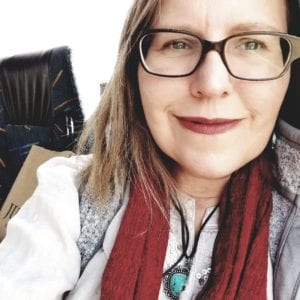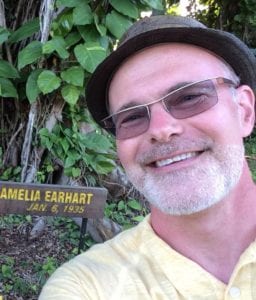The Chicago School started with a single program: the Psy.D. in Clinical Psychology. As its flagship program, the Psy.D. in Clinical Psychology is integral to The Chicago School—and now found at all seven of its campuses across the country.
In this series, we spotlight Clinical Psychology faculty at three campuses: Dallas, Los Angeles, and New Orleans. These experts have a trove of experience and insights to offer, and we’re proud to showcase them.
Recently, The Chicago School at Xavier University of Louisiana (XULA) graduated its first class from the Psy.D. in Clinical Psychology program. Launched in 2015 to help New Orleans rebuild its mental health infrastructure post-Hurricane Katrina, the program is the only clinical psychology doctoral program in the New Orleans metro area.
“When Xavier and The Chicago School partnered to bring the first clinical Psy.D. program to New Orleans, our goal was to help meet the mental and behavioral health needs of the region,” said The Chicago School Campus Dean Margaret Martyn, Ph.D. “It’s exciting to see that goal becoming a reality.”
For our third and final spotlight, we hear from Margaret Smith, Psy.D., and Richard Niolon, Ph.D., two faculty members in the program at The Chicago School at XULA.
 |
 |
The Psy.D. in Clinical Psychology is The Chicago School’s flagship program. What separates it from other universities that offer it?
Margaret Smith, Psy.D.: I believe that what separates our Psy.D. program from that of other universities is our emphasis on developing culturally competent health service practitioners. Given the diversity represented in the United States, it is critically important for psychologists to be able to work effectively with diverse populations. As we have seen during this pandemic, mental health needs cross all socioeconomic and cultural barriers. Yet many populations are marginalized and underserved, creating enormous health disparities. I believe we serve to both train graduate students to be competent in working with diverse populations and increase the number of practitioners who can genuinely represent the diversity of this country.
Richard Niolon, Ph.D.: I think what all clinical psychology programs offer is clinically focused classes, training in the community, and research experience. What makes us different, I think, is the integration across these areas. Students train in local health care settings under local licensed psychologists. We talk regularly with these psychologists to see how prepared our students are and how ready they are for clinical work in the real world. We use their feedback to adapt our classes to better prepare students. Students begin working on psychological research ideas in their first year and present these ideas at local conferences to a variety of health practitioners. Our students also take some classes and train with other kinds of practitioners. We want their research work to be applicable to real-world problems, so we support and create these kinds of opportunities so that our students know what is happening for real-world providers in real-world health care settings. Our faculty get involved in the local community at the state level and local professional organizations. This allows us to be involved in the community and to get to know the local providers. When they decide they will help us train our students, it’s because they know who the faculty are and trust that our investment in the community is real. In short, everything we do to train our students is part of an integrated process.
What’s special about working at The Chicago School at XULA?
Dr. Niolon: New Orleans and Louisiana are unique. New Orleans had the first racially integrated police department in the U.S. in 1870. Mardi Gras reflects French, Caribbean, African, and Native American traditions, separated but blended, until it has become a new cultural experience of its own. Every year, Louisiana is hit by hurricanes, and in fact, we lose 16 square miles of the state’s land every year to the Gulf. A rich history of people from every walk of life are living, loving, fighting, and surviving together here. After four years, I can’t claim to have really scratched the surface of what it is to live here.
Beyond that, Louisiana has one of the smallest number of psychologists per capita, if not the smallest. As a result, people in Louisiana do not have access to the mental health care they need. That’s why we wanted to open a program here. If we want to train psychologists who will invest and give back to this community, then we probably would be most successful recruiting students who already live and invest their lives here. Xavier University of Louisiana is dedicated to celebrating the rich history of Louisiana and to improving the lives of the people of Louisiana. This goal weaves its way through everything they do. They have made a space for us in the heart of their community. It’s been an act of welcoming and embracing our shared mission and an acknowledgement that there’s a lot of work to be done.
Read Related
5 career paths for a Psy.D. in Clinical Psychology
New student frequently asked questions: Psy.D. in Clinical Psychology
What to expect in a Psy.D. in Clinical Psychology program
Why did you choose to work at The Chicago School? What is your favorite thing about teaching clinical psychology at The Chicago School?
Dr. Smith: I chose to work at The Chicago School at Xavier University of Louisiana because I believe we are putting into practice the core values of The Chicago School by working in the framework of an HBCU in New Orleans, where the population has been marginalized and underserved in the area of mental health services. Many academic institutions have diversity statements or missions that are meant only as assurances and not actionable plans with the intent to manifest sustainable change. Our program is a significant commitment to this community and its citizens. It makes me really proud to serve here.
My favorite thing about teaching here is to witness and contribute to the growth and development of our students. Our students come to our program with a unique blend of personal experience and abiding passion for positively contributing to their respective communities. It is my honor to serve them. It makes me exceptionally happy to be able to facilitate a positive, constructive learning environment for them to shift between being a concerned citizen to a practitioner and really begin to feel and own their emerging competencies and contributions.
Dr. Niolon: That’s a complicated question. I trained at a Ph.D. program that was clinically oriented. I was told we were just like a Psy.D. program but also included training in research. Then I got out into the real clinical world, worked with people with Psy.D.s, and saw things differently. I value the clinical and research training I got, but I felt a bit jealous of my Psy.D. colleagues. After some years, I started teaching a class a semester at The Chicago School and found the opportunity to share what I learned in school as well as in real clinical practice—kind of a combination of what I was glad I learned and what I wished I had learned too. The students I taught were focused on getting ready to do culturally sensitive, ethical, and effective work in real clinical settings, so I felt I had something to offer them. There came a point in 2003 when I found teaching to be energizing, to feel like making a difference, more so than just clinical work, and so I joined The Chicago School full time.
Selfishly, I’ll say I get paid to learn. Faculty and students are focused on doing psychology well, whatever kind of psychology it is. New research, new perspectives on classic work, and new areas where psychologists are asked to contribute make it a dynamic place. If you like to learn, you can learn something you didn’t know in every conversation you have. The faculty, staff, and students create a place where learning is a priority, something we enjoy, something we are driven to do. Many people don’t get to work in an environment where they do what they love, and so does everyone else around them.
Do most people get a Psy.D. to work in private practice? Or for larger agencies? Why did you choose to get yours?
Dr. Smith: I believe the majority of people who get a Psy.D. do so in order to both contribute to the field in terms of scholarship and to practice, whether it be in community or private practice. I see opportunities and a dire need for Psy.D.s to be involved at the local and national government levels in order to truly solidify the changes that are needed as well. We can be the best advocates for communities owing to our intersectionality of being both practitioners and scholars and our voices are needed at the governmental agency levels.
I chose to get my Psy.D. because I wanted the best possible training to serve individuals and communities, and I believed and still believe in the mission of The Chicago School.
Read More
Clinical Psychology Faculty at the Los Angeles Campus
Clinical Psychology Faculty at the Dallas Campus
What research have you done? What area of psychology do you like to focus on?
Dr. Smith: I’ve recently been working on a book chapter as a co-author with other Native Americans around climate change, indigenous movements, and resilience. I’ve enjoyed this work immensely because it has allowed me to collaborate with other Native American psychologists and bring awareness to the unique issues faced by indigenous populations seeking social justice. I believe the book chapter will be published in 2021.
I’ve also been working on an article that followed a presentation I did in Norway with Native American graduate students on the issues that arise for indigenous students in academic settings. I recently published an article in the Journal of Alcoholism Treatment Quarterly called “Things Transformed: Inalienablity, Indigenous Storytelling and the Quest to Recover from Addiction.”
I’m currently in the process of working on a paper regarding the historical and current use of contelipro and counterterrorism surveillance tactics used against minority activists in the United States. This came about after my experiences at Standing Rock several years ago, which resulted in an educational paper put forward by the Society of Indian Psychologists on the use of counterterrorism tactics against Native people and our allies. I am also very concerned regarding the use of such tactics against Black Lives Matters activists and other groups. I believe there is the potential for significant psychological harm to come to activists who are faced with these tactics and would like to facilitate the awareness of these ongoing issues nationally.
What is the key takeaway you hope students have when graduating from The Chicago School?
Dr. Niolon: Coming to The Chicago School means making a commitment to lifelong learning. In this day, COVID-19 has changed our lives permanently. We really don’t know what the long-term social, physical, and psychological outcomes will be, but we will be studying them. Further, our country is politically divided; this divide includes disagreement over what is the “right” course for our country, how we will follow that course, which problems we will prioritize, and which problems we will ignore. If there were ever a time when we need people who think about the ethics of our actions, about the consequences of our choices for people today as well as for the next generation, then that time will be the next 20 years. Our field will be called on, and there will be new challenges that I can’t even imagine. We have a great deal to learn in the next 20 years if psychology is to be ready to “step up” when needed.
Learn more about the Psy.D. in Clinical Psychology
The Chicago School’s Psy.D. in Clinical Psychology program prepares students for careers in a wide range of settings, including nonprofit, health care, community, and the government. Building upon a strong base of coursework, theory, science, and practice, and guided by our practitioner-scholar faculty, our graduates are well-prepared to provide assessment, intervention, and consultation to meet the needs of diverse populations. Learn more by visiting our clinical psychology program page at the XULA Campus or complete the form below to request more information.

